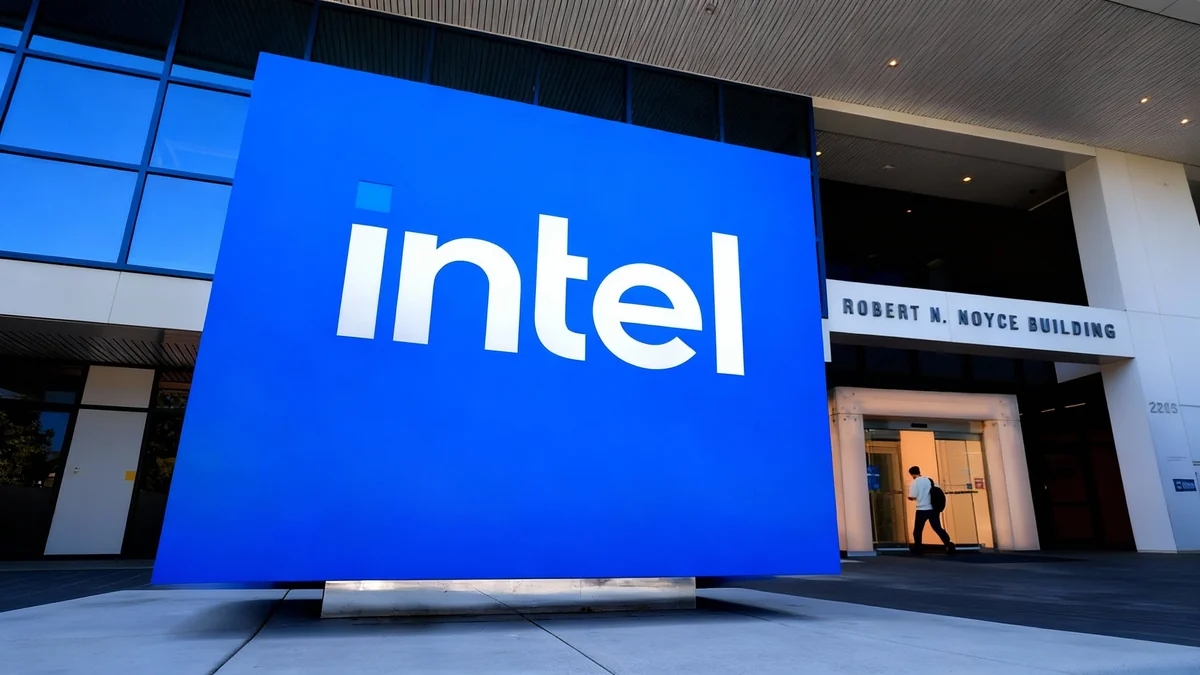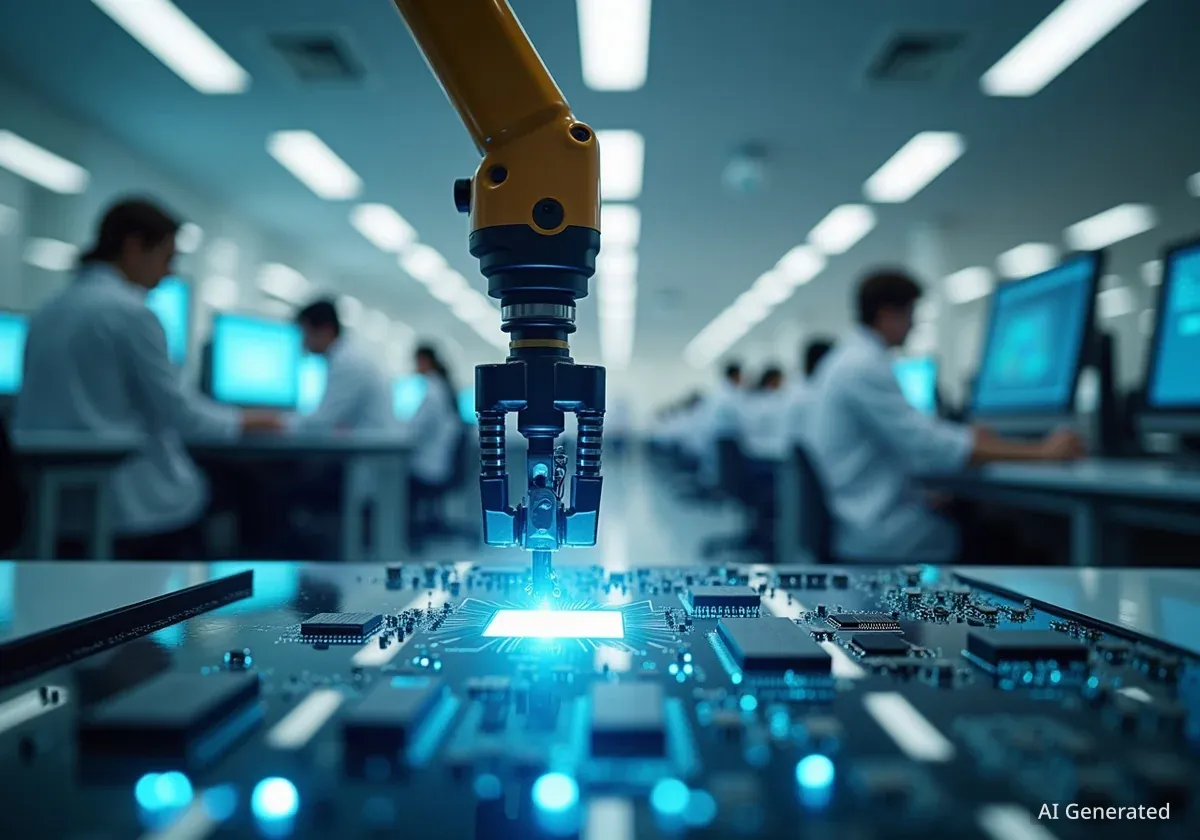Broadcom, a technology company with a market capitalization of $1.6 trillion, is experiencing substantial growth in its artificial intelligence division. The company's strategy of developing custom AI chips in partnership with major technology firms is driving a significant revenue increase, positioning it as a key competitor in the expanding AI hardware market.
Key Takeaways
- Broadcom's AI-related revenue grew 63% year-over-year in its third quarter, reaching $5.2 billion.
- The company specializes in custom AI accelerators, known as XPUs, designed for specific client workloads.
- This custom chip approach offers a potential cost and performance advantage over general-purpose GPUs for standardized tasks.
- Despite its massive size, Broadcom is not widely known by the general public, unlike competitors such as Nvidia.
- The company's stock trades at a high valuation, reflecting market optimism about its future AI growth.
A Technology Giant Operating in the Background
While companies like Nvidia have become household names due to the AI boom, Broadcom has maintained a lower public profile despite being one of the world's largest companies. With a valuation of approximately $1.6 trillion, it ranks as the seventh-largest public company globally.
Broadcom's business is diverse, providing essential technology across various sectors. Its portfolio includes cybersecurity software, mainframe hardware, and enterprise cloud solutions, notably through its acquisition of VMware. This wide range of established products provides a stable foundation for the company's more recent expansion into high-growth areas.
However, the company's most rapidly expanding segment is focused on artificial intelligence. As demand for AI computing power intensifies, Broadcom's role in supplying critical hardware components is becoming increasingly important to the industry.
Understanding Broadcom's Business
Unlike consumer-facing tech companies, Broadcom primarily serves other large corporations. Its products are fundamental components within data centers, networking equipment, and enterprise software systems, making it a crucial but often invisible part of the technology ecosystem.
The Strategy Behind Custom AI Chips
Broadcom's approach to the AI market centers on two key product categories: high-performance connectivity switches and custom AI accelerators. The connectivity switches are vital for networking within data centers, allowing thousands of processors to work together efficiently on complex AI tasks.
The more significant growth driver is its custom AI accelerator business. These chips, which Broadcom refers to as XPUs, are developed in direct collaboration with clients, often large cloud providers or "hyperscalers." This co-design process ensures the final product is optimized for the specific, repetitive workloads the client intends to run.
XPUs vs. GPUs: A Different Approach
Nvidia's Graphics Processing Units (GPUs) are designed for versatility and can handle a wide array of computational tasks, making them powerful general-purpose tools for AI development and deployment. This flexibility is a key reason for their widespread adoption.
In contrast, Broadcom's XPUs are purpose-built. By focusing on a narrower set of tasks, these chips can potentially achieve higher performance and greater energy efficiency for those specific operations. For large companies with standardized AI workloads, this can translate into a lower total cost of ownership compared to using more versatile, and often more expensive, GPUs.
The Data Center Opportunity
The market for AI hardware is projected to grow substantially. According to analysis from Nvidia's management, total global capital expenditures on data centers are expected to reach between $3 trillion and $4 trillion by 2030. This massive investment cycle will benefit all major hardware suppliers, including Broadcom.
Translating Strategy into Financial Growth
Broadcom's financial results show that its AI strategy is delivering significant returns. While artificial intelligence is currently a portion of its total business, it is growing at a much faster pace than its other segments.
In its fiscal third quarter of 2025, which ended on August 3, Broadcom reported a total revenue increase of 22% year-over-year, reaching $15.9 billion. During the same period, its AI-specific revenue saw a much larger increase, growing 63% year-over-year to $5.2 billion.
The company's forward guidance indicates continued momentum. Broadcom anticipates that its AI revenue will climb to $6.2 billion in the fourth quarter. As the AI segment constitutes a larger share of total sales, it is expected to accelerate the company's overall growth rate.
"As AI starts to capture a larger portion of Broadcom's business, its overall growth rate will increase, transforming Broadcom into a top-tier growth stock along the way."
Valuation and Market Outlook
The market has taken notice of Broadcom's potential in the AI sector. This investor optimism is reflected in the company's stock valuation. Currently, Broadcom's stock trades at a forward price-to-earnings (P/E) ratio of over 50, which is considered high and indicates that investors expect strong future earnings growth.
This premium valuation presents a key consideration for investors. While the price suggests much of the anticipated growth is already factored in, the sheer scale of the AI market expansion could provide further upside. The ongoing "AI arms race" among major technology companies requires immense investment in computing infrastructure.
Broadcom is positioned to capture a meaningful share of this market with its custom-built chips. By offering a specialized alternative to general-purpose GPUs, the company has created a distinct and valuable niche. This strategic positioning could not only fuel further financial growth but also elevate Broadcom's public profile, potentially making it the next technology giant to become a household name.





